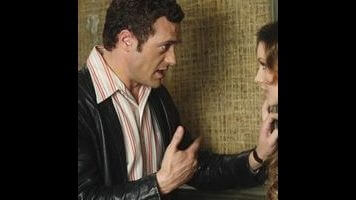Life On Mars: "The Real Adventures Of The Unreal Sam Tyler"

When you've got as strong a concept as Life On Mars, the big trick is how to keep it fresh. In a movie, the trouble would be in making sure the set-up and follow-through flow as convincingly as possible: guy gets hit by car, guy wakes up in 1973, stuff happens, we figure out if its time travel or hallucination, the credits roll. Perhaps a bit of casual nudity tossed in for the kiddies.
But we're not talking movie here, we're talking TV show, which means we have a storyline with an indeterminate ending point. Ideally, Mars is going to be on the air for years to come, which changes how you handle Sam Tyler's dilemma. It can't resolve until the last episode, so what kind plots do you throw out in the meantime? There's got to be something to fill the spaces between clues and visions.
If "The Real Adventures of Unreal Sam Tyler" is any indication, it looks like we're getting a procedural; much like in the pilot, a crime is introduced in the first act, suspects are investigated, the mystery deepens, and then there's a final twist that implicates somebody we never even considered but probably should've. Stripping away all the mystical elements and characterizations, the AAA robberies were white noise. Like the medical mysteries on House, it served more as packing material to keep the good bits from falling out.
After a never-explained (making it all the better) pool-side sting, Sam and the gang arrest Kim Trent, suspect in a series of check-cashing store robberies that netted $12,000, along with three innocent corpses. Gene is convinced they have their man, but Sam doesn't think they have enough evidence; when Gene wants to plant something on the guy, Sam insists they let him go so they can follow him and build a better case. The plan has mixed results–Trent gets himself shot robbing another store, and June, the station's secretary, is caught in the crossfire. While Gene seethes over June's coma, Sam tries to track down Trent's accomplices, a trail that apparently leads back to the police department.
The investigation is notable mostly for the small details. The casual brutality is played more for laughs than shock value, but the atmosphere it creates is different from the cop shows we're used to; gone is the standard routine of interfering lawyers and trumped up technicalities. Sam remains the lone voice of reason in the wilderness, and when his plan to stake out Trent winds up with June in the hospital, it's not impossible to see Gene's side of things. Of course, that's until it turns out June was actually involved in the robberies. It's the weakest sort of twist–throwing in a guest star (Heather Matarazzo), and giving her a couple scenes being sweet so that her suffering, and eventual criminality, are a shock.
Stuff like this… I dunno. It wasn't as bad as it could've been. I had a brief moment where I thought the newly introduced asst. DA was crooked, and that would've been flat out terrible. Plus, it made for some nice real/unreal thematic elements when Sam realizes that the cops supposedly involved with the robberies were actually fake, dressed up in uniforms that June had cleverly smuggled out of the station house. Sam's biggest problem right now is trying decide which part of reality is fake, his memories or what his senses are telling him; the phony cops, while not explicitly connected, give the struggle an added spin. But right now, if that was all the show had to offer, it wouldn't be much. Just another in a long line of convenient mysteries.
 Keep scrolling for more great stories.
Keep scrolling for more great stories.
